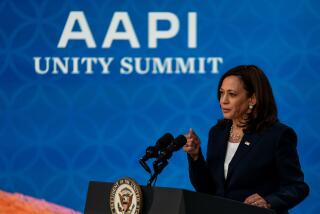Currents in the Mainstream
- Share via
From Chinatowns, the rural South and Hawaii, two dozen students of Asian descent arrived at UCLA’s law school in 1980. They were the first large class of Asian Americans at the school.
Most of them ate, studied and partied together. They played in a band called Tower Tofu. And they fought to keep the law school’s affirmative action program alive, once waging a sit-down protest at the administration office.
“We all felt so confident that we could make an impact,” recalled Larry Chew, a second-generation Chinese American whose parents ran a gift shop in San Francisco.
Today, their black hair shorter and mottled with white, they have reached 40 and the midpoint of their careers. With few exceptions, they have firmly grasped the middle-class dream, some with a measure of financial success that they could never have imagined.
But their journeys have been distinctly Asian American. Like signs on a road, their heritage and identity have affected their career choices and how they viewed their progress. Unlike their immigrant parents and grandparents who spoke halting English, they have moved seamlessly in the mainstream.
However, they do not all feel fully vested in the workplace either. Some say they feel loneliness, yearn for greater respect and dream about the day when they will be seen not as Asian American lawyers, but as lawyers.
Mike Sawamura was among several classmates who never considered joining a big law firm. He wanted independence, but that wasn’t the only reason. “When you apply, there aren’t too many Asians up there,” Sawamura said. “They ask, ‘Can you bring in corporate clients and can you speak Japanese?’ They expect you to bring Pacific Rim clients, even though you were born here.”
So it came as little surprise to Sawamura that just two of the 24 Asian Americans in his class today are partners at major U.S. law firms, both men, both bilingual. Others quit or felt blocked midstream, switching to what they saw as a safer, more viable path, starting their own practice or joining with other Asian Americans.
Sawamura set up shop in downtown Sacramento, a few blocks from where he grew up in a tiny apartment. He later joined with classmate Lyle Nishimi, and they have built a solid business together. A quarter of their clients are Asian Americans, but they also do work for Pacific Bell and Bank of America.
“Someday I hope to compete with the big boys in town,” Sawamura said. “I can beat them in cases, but not in terms of influence, structure and power.”
Sawamura and the dozen others interviewed say they have faced little overt discrimination. For most, issues of race and ethnicity present little tension in the workplace, and they generally move easily between their Asian and American selves. “I’ll show up at lunch with a pair of chopsticks and I don’t care what others think about it,” said Anthony Joji Taketa, a partner at Poindexter & Doutre, a small Los Angeles firm.
But it has been harder for the seven Asian American women in this class of ’83.
Debbie Young is one of 10 Asian Americans in Bank of America’s legal department of 150. She grew up one of a handful of Asians in Helena, Ark., so she was used to being in the minority. But during her career, she has had reminders of how differently she is perceived.
Young remembers one day when she walked into a courtroom rolling a box full of legal documents. As she tells it, her opposing counsel kept asking her if she needed a special chair. “Aren’t you the court reporter?” he asked at one point.
Young, a petite woman with a Southern accent, can be as aggressive as anybody, and she’s confident her ability would not be overlooked if she sought to move up at B of A. But Young chooses to work part time so she can spend more time with her two children, who she and her Japanese American husband hope will grow up feeling comfortable about their place in America. The Youngs send them to preschool in Little Tokyo. “If there are lots of kids who look like them, they won’t feel so different,” Young said.
Myra Sun, a federal public defender, says she feels at home among her colleagues on the 15th floor of the U.S. courthouse downtown. But when Sun goes down to the courtroom, her gender and race rise to the forefront in her mind. “It’s automatic now,” Sun said. “I say, ‘He has an advantage because of who he is, even if he is an incompetent boob,’ ” she said, referring to some of the older, white males who fill the courts.
Sometimes, Sun daydreams of looking up at the bench and seeing an Asian American woman, someone who looks like her and may be less likely to view her as “a little Oriental girl.” Then, Sun says, maybe she will not be inclined to see herself that way.
“I have a little place on my shoulder where I put it,” Sun said of such race and gender issues. “It’s a lighter load now because I’m stronger. But I’d like to think of the day when it’s not there.”
More to Read
Sign up for Essential California
The most important California stories and recommendations in your inbox every morning.
You may occasionally receive promotional content from the Los Angeles Times.














